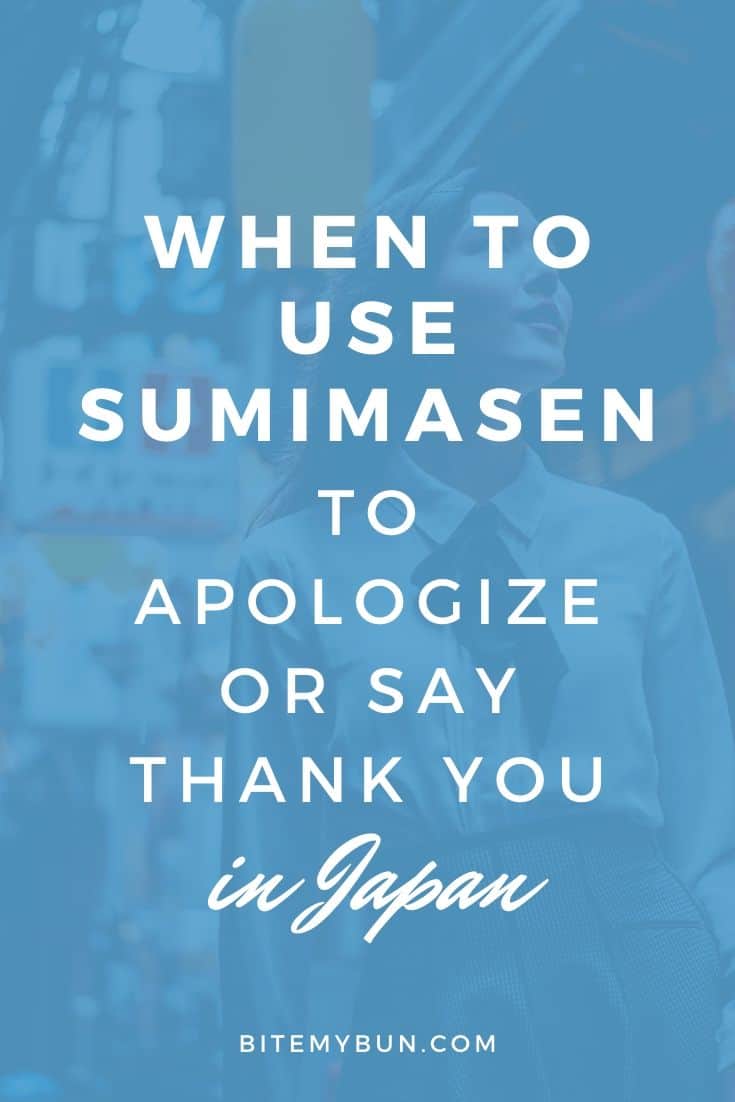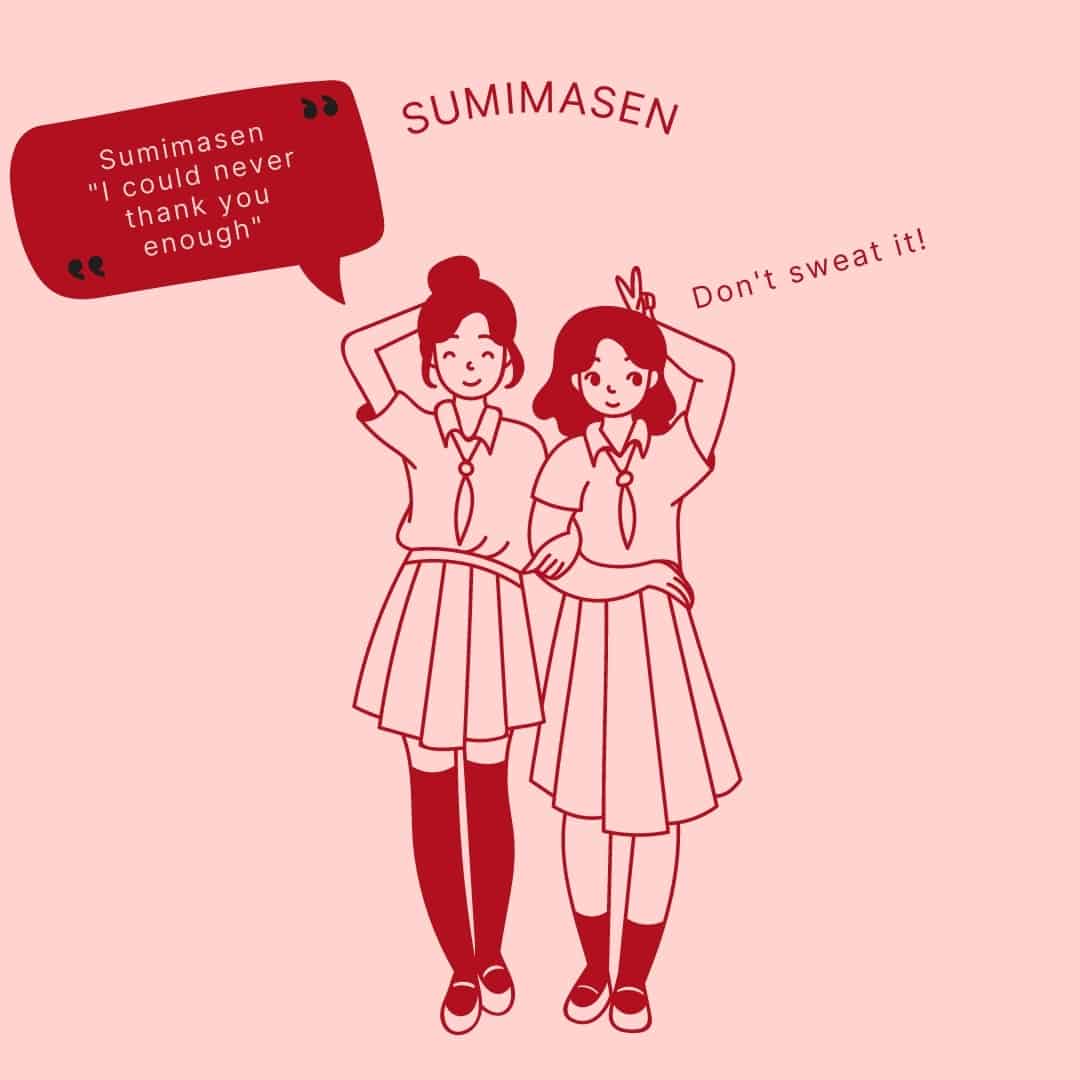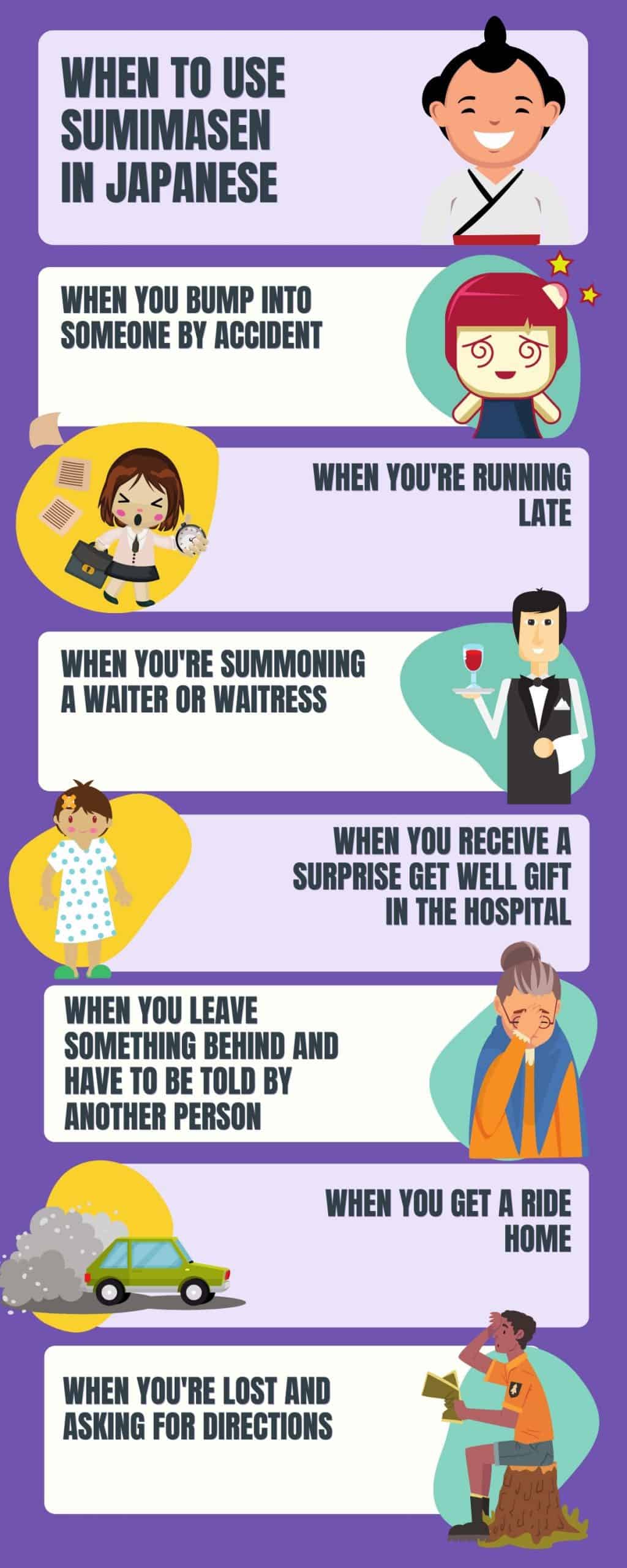What does “sumimasen” mean? When to use this versatile word
If you’re planning on going to Japan, but you don’t know the language, the word “sumimasen” can help a lot. That’s because it has a variety of meanings!
Sumimasen can mean:
- I’m sorry,
- Thank you, or
- Excuse me.
However, no matter what context it’s used in, the different meanings are all related.

If this is getting confusing…yeah, you’re not alone.

Check out our new cookbook
Bitemybun's family recipes with complete meal planner and recipe guide.
Try it out for free with Kindle Unlimited:
Read for freeIn this post we'll cover:
- 1 What does the word “sumimasen” mean?
- 2 Synonyms for “sumimasen”
- 3 Arigatou vs. sumimasen
- 4 Sumimasen vs. shitsurei shimasu
- 5 Sumimasen vs. suimasen
- 6 Why do the Japanese always say sorry?
- 7 Can saying “sumimasen” get you in trouble?
- 8 How to pronounce “sumimasen”
- 9 How do you respond to “sumimasen”?
- 10 Why do the Japanese bow?
- 11 Is “sumimasen” rude?
- 12 Exploring the etymology of “sumimasen”
- 13 Why “sumimasen” might be the only word you need
- 14 Add “sumimasen” to your vocabulary
What does the word “sumimasen” mean?
“Sumimasen” means “thank you”, but it also means, “I’m sorry for the trouble you’ve gone through”. In this way, it means “I’m sorry” and “thank you” at the same time and acknowledges the effort someone’s put into helping you out.
What is “sumimasen”, literally?
When you go back to the origin of “sumimasen”, it stems from “sumanai”, which means “unfinished”. That’s maybe why “sumimasen” literally means “isn’t enough” or even “isn’t the end of it”, so however you say sorry or give thanks, it could never be enough.
And it probably isn’t (or shouldn’t be) the last they’ll hear from you, as you can now start to find ways to make it up to them :)

When should you use the word “sumimasen”?
In Japanese culture, “sumimasen” can be used in any of the following situations:
- When you bump into someone by accident
- When you’re running late
- When you’re summoning a waiter or waitress (In this sense, “sumimasen” is used as a substitute for “excuse me”. It’s often accompanied by the phrase “chumon o shitai no desu ga”, which means “excuse me, I’d like to order”.)
- When you receive a surprise get well gift in the hospital
- When you leave something behind and have to be told by another person
- When you get a ride home (you see the trouble someone’s taken to go out of their way?)
- When you’re lost and asking for directions
- When you need to get off a crowded train (In this case, “sumimasen” is often accompanied by “oriru no de toshite kudasai”, which means “excuse me, I’d like to pass”)

Synonyms for “sumimasen”
There are other ways to say “I’m sorry” and “thank you” in Japanese. However, they don’t really have the exact same meaning, so some could be used in one situation, but not another.
How to say “thank you” in Japanese
One way to say “thank you” is to use the word “osoreirimasu”. This is a very polite version of the phrase “thank you” and it’s not something that you’d use every day.
It’s usually used when talking to customers or bosses. You wouldn’t use it when speaking to friends or family members.
And “osoreirimasu” is only used to say “thank you”, never “I’m sorry” or “excuse me”.
How to say “I’m sorry” in Japanese
“Gomen nasai” is another possible substitute. It’s derived from the word “gomen”, which means “to beg forgiveness”.
Are gomen nasai and sumimasen the same?
Gomen nasai differs from sumimasen because sumimasen does not ask people for forgiveness. It’s simply an acknowledgment that the person saying it has done something wrong. In use, gomen nasai is often more informal and used among family and friends, whereas sumimasen is often used with one’s seniors.
“Honto ni gomen ne” can also be used. It means “I am really sorry”. “Honto ni” means “really” and adding it in makes it seem as if your apology is more heartfelt.
“Sogguku gomen ne” is an expression to be used between family members and close friends. It means “I am truly sorry”.
“Moushi wakenai” is another way to apologize. This expression means “I feel terrible” and is usually used to apologize to someone you don’t know that well or someone who has a higher status than you do.
“Moushi wake armasen deshita” can be used in similar situations. It translates to “I am really sorry. I feel terrible”.
But you can also use “sumimasen deshita” in a similar way.
“Sumimasen deshita” is used when you want to say that you’re sorry, but more formally. It’s usually reserved for talking to your boss or elders, but it can also be used to emphasize the gravity of the situation and when’ve you made a huge mistake.
Literally, when you add “deshita”, you create the paste tense of the world “sumimasen” and make it into “I’m sorry for what I did”, emphasizing that you’re truly reflecting on what happened.
A deeper way to apologize is to use the word “owabi”. This is one of the most formal ways to apologize and it was famously spoken to the Japanese people by their Prime Minister Tomiichi Murayama.
He used the word to express his deep regret over the damage and suffering his people experienced due to “colonial rule and aggression”.
Arigatou vs. sumimasen
“Arigatou” is another way to say “thank you” in the Japanese language.
However, sumimasen means “thank you” on a deeper level because it also acknowledges that the action they’re thanking the person for may have caused an inconvenience.
There are many ways to say “thank you” using the word “arigatou”. Here are some examples.
- Arigatou: thank you.
- Doumo arigatou: Thank you very much.
- Arigatou gozaimasu: This is a more polite form of thank you.
- Doumo arigatou gozaimasu: Thank you very much.
Sumimasen vs. shitsurei shimasu
There are many ways to say “thank you”, but there are also several ways to say excuse me.
“Sumimasen” can be used to mean “excuse me”, but “shitsurei shimasu” is a more polite way to say “excuse me”. It’s reserved for use at formal occasions and between strangers.
Some will be even more formal by saying “osaki ni shitsurei shimasu”, which means “excuse me for leaving early/before you”.
However, it’s since been shortened and most will use “osakini” or “shitsurei shimasu”, but rarely will they use the two together.
When “osaki ni” is used on its own, its translation is more along the lines of “excuse me, I have to go”.
Sumimasen vs. suimasen
There’s a bit of confusion about the origin of “suimasen”.
Some think it’s a slang version of “sumimasen” while others think it was adopted when people said the word “suimasen” quickly.
Both are kind of similar ideas.
Really, the long and short of it is, both words mean “thank you”, but “sumimasen” is a slightly more polite way of saying it.
If you’re unsure of how “suimasen” will come across, it’s best to stick with saying “sumimasen”.
Why do the Japanese always say sorry?
There are various ways to say”I’m sorry” and “excuse me” in the Japanese language, and it’s a big part of the country’s culture. But it’s more about being considerate and polite than apologizing, and showing your readiness to learn from the mistake and do better.
This is quite unique and there aren’t many cultures in the world that share this type of thinking.
Japanese people are very aware of their surroundings and what others think of them. They’re careful not to bother others with their actions and remarks, and are very conscious of being decent people.
Because they’re so concerned about the impression they make, they’ll use words like “sumimasen” to smooth things over and avoid any possible confrontation or actions taken out of context.
In this way, the word can almost be used as a kind of self-defense. It can prevent an uncomfortable situation from occurring….even if the uncomfortable situation never would’ve occurred in the first place!
Can saying “sumimasen” get you in trouble?
While “sumimasen” is usually meant to smooth things over, it can sometimes get people in trouble.
For instance, say you’re caught in a traffic accident. If you say you’re sorry, it can be seen as an admission of guilt.
However, people in Japan are so used to saying “sumimasen”, they may just say it anyway, even if they know the other person is at fault.
But you really should be careful in using it in these situations and reserve it for when you really are at fault.
How to pronounce “sumimasen”
If you put the word “sumimasen” into Google Translate to translate it to English, it’ll come back with the words “excuse me”. This is the most literal English translation of the word.
If you’re wondering how the word is pronounced, it’s broken down like this:
Soom me ma sin
The accent is put on the second syllable and the vowel sound is pronounced like a long “e”. There’s no emphasis at all on the last syllable.
You can hear exactly how it’s pronounced by listening to this video:
How do you respond to “sumimasen”?
When someone says “I’m sorry”in English, there’s no one perfect response.
For instance, when someone says “thank you”, we say “you’re welcome” or “no problem”, but when someone says “I’m sorry’”, there really is no set thing to say in return.
However, just leaving someone hanging after they apologize can be quite rude.
Japanese culture is similar. There’s really no one set response that’s called for when someone apologizes. However, it’s always best to respond.
Here are some possibilities for suitable responses.
- Bow your head: This merely means you acknowledged their apology. It may be all that’s necessary, especially if you don’t know the person that well.
- Iya iya, ki ni shinaide: Don’t worry about it.
- Daijoubu desu: It’s okay.
- Mondain ai desu: It’s no problem.
- Ki ni shinaide (kudasai): Don’t worry please.
If you’re responding to someone quite a bit older than you, or if you’re talking to a superior at work, you’ll want to take the more formal route.
This means you’ll want to say “I’m sorry” as well. In these cases, you can respond with “sumimasen”, “gomen nasai”, or “shitsurei shimasu”.
You should also bow as you say these phrases.
If you’re planning on leaving, you should be bowing while you walk away.
Why do the Japanese bow?
Let’s take a somewhat tangential route and explore why the Japanese bow so often, especially when apologizing.
Bowing is a sign of respect in many Asian cultures. Bows that are deeper and longer will be even more meaningful.
When a deep bow accompanies an apology, it means the apology is deeper and longer-lasting. So make sure you give a deep bow when saying “sumimasen”!
Is “sumimasen” rude?
In general, “sumimasen” isn’t rude, but it can be if it’s used in the wrong situation.
“Sumimasen” is a lighter way of apologizing. It can be used when you accidentally strike someone or when you’re running a bit late.
However, if you try to use it when a more extreme apology is called for, it can be taken the wrong way.
If you’re looking to make a more extreme apology, try going with “gomen nasai” which means “please forgive me”. This phrase is more universal and it can be used in both formal and casual situations.
If you want to express a deep apology, try phrases like “gomeiwaku wo okake shite”, “moshiwake gozaimasen”, “moshiwake arimasen”. or “owabi moshiagemasu”.
These are best expressed when you bow your head as well.
Exploring the etymology of “sumimasen”
“Sumimasen” originates from the word “sumanai”. Although the word means “unfinished”, its root, sumu, means “with an unburdened heart”.
So it’s similar in meaning to “ongaeshi ga sunde inai”, which means the act of repaying kindness is unfinished.
It can also be related to “jibun no kimochi ga osamaranai”, which means “I cannot accept this just like so”.
When you think of these more literal translations, you can see how “sumimasen” can make an insufficient apology in some instances.
Why “sumimasen” might be the only word you need
If you travel to Japan, the language might be a major barrier. The Japanese language and English are quite different, and it can be difficult to master the words themselves, much less the grammar!
“Sumimasen” comes in handy because it has a variety of meanings. More than that, it can help if you’re lost.
For instance, say you’re trying to find Shinjuku Station. There are several things you can ask.
For example, you could say, “Sumimasen. Shinjuku eki wa doko desu ka”. But to an English speaker, this phrase may be a bit complicated.
A simplified version is “Sumimasen. Shinjuku eki wa?” Once you understand” eki” means “station”, it shouldn’t be too hard to translate.
But to make things even simpler, just ask, ‘’Sumimasen. Shinjuku Station?”
Sure, the grammar isn’t great, but almost anyone you ask will understand and you’re likely to find out where you need to go.
Add “sumimasen” to your vocabulary
“Sumimasen” is a word that everyone should know if they go to Japan. It has multiple meanings, is a big part of Japanese culture, and can even help you get around town a bit easier!
Also read: What Does Omae Wa Mou Shindeiru Mean?
Check out our new cookbook
Bitemybun's family recipes with complete meal planner and recipe guide.
Try it out for free with Kindle Unlimited:
Read for freeJoost Nusselder, the founder of Bite My Bun is a content marketer, dad and loves trying out new food with Japanese food at the heart of his passion, and together with his team he's been creating in-depth blog articles since 2016 to help loyal readers with recipes and cooking tips.
